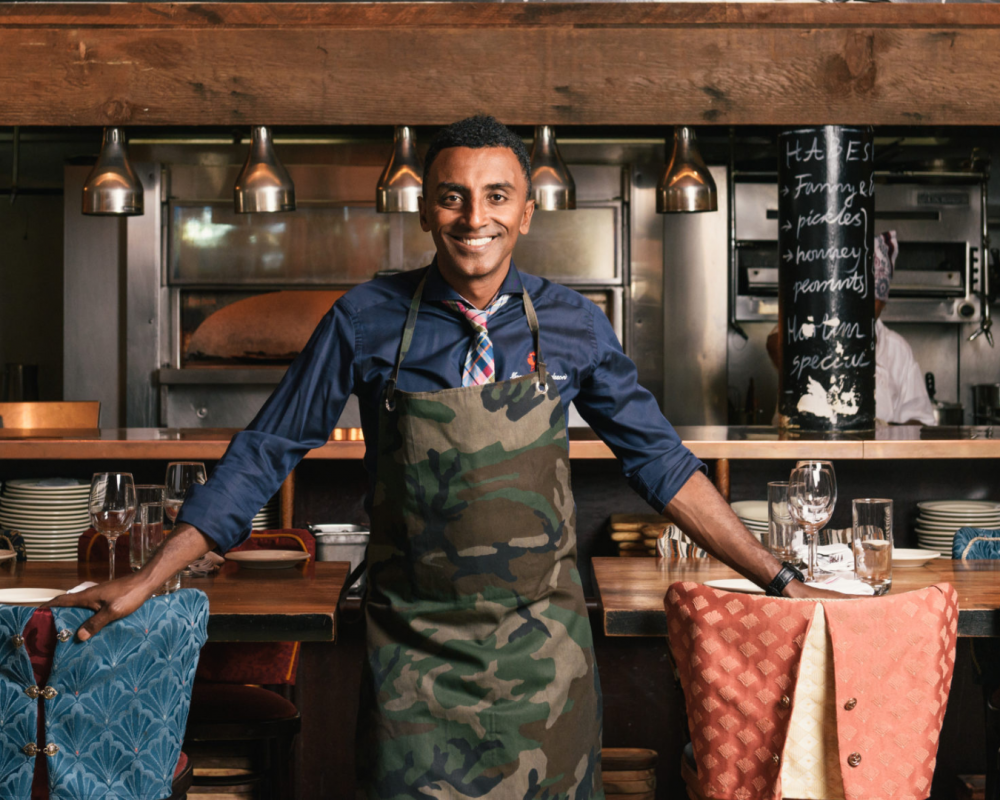Sitting down with Christopher Kimball on an episode of Milk Street Radio, the restaurateur talks the importance of curiosity when exploring cuisines, how Black Americans have shaped what we think of when we think of American food (often without credit) and why he considers his son Zion to be an Ethiopian kid being raised in Harlem.
Read excerpts from the interview below, and listen to the full episode here.
On the importance of giving credit when credit is due
One of the biggest blessings that I've been given is as a Black person to actually talk about complexity in my art form, which [the] majority of people of color actually never get the chance to do. So, I am extremely grateful to the audience and the opportunities of that, and you have to recognize your privilege...I'm setting a table, but I'm bringing in these incredible people that, some of them are very known, some of them not so known, but it shows the layers and the complexity of it, which food does explain in many, many different ways.
But we haven't had that deep conversation about it the way for example, other art forms have had, right? If you and I would go and have a conversation about gospel, jazz, rock and roll, hip hop. Your next question is what era? Right? You don't have to be a huge music lover, but you understand there are differences here, right? What I always felt like African American and Black people in this country has done so much for American food. But we're written out of the authorship of it. And that then really then changes the aspirations. Why should we go into food, and the inspiration, but it also changes everything on a financial level, too, right? So you know, if Nearest Green would have gotten 10 cents on every Jack Daniels ever sold, that would have changed not only for Nearest Green, but for his family and the legacy after that.
On raising his son Zion in three different cultures in Harlem
It's not one linear path. You can actually be Swedish like Zion, being a Black, brown-skinned kid, with super curly hair, and live in Harlem, and feel connected to this trilogy between America of course, Sweden as a place where we go in the summertime, and Ethiopia, as a place of originality, where I will say, culturally, his mom and I are raising him very much like an Ethiopian kid in Harlem. So, I do think it's important that he is connected to all the three and that's the blessings of being in America is that you can clearly identify with all three.
On the many joyous, energetic paths that make up Black foodways
America is very interesting, because so much of American food actually comes and is linked from West Africa. That broken rice that you see came to the Carolinas, and the Gullah culture took their own spin on that. And the techniques of barbecues, for example. So much of the food that we actually adore. Or you think about grits, you think about the food that we really think through as American food today, come from West Africa. But then also it's been this incredible layering. And that's what makes American food like a cuisine like Creole. For me, that is a complete link between France, Haiti, Africa, West Africa, to Spanish and America. Only that cuisine can really take place in America in a way. So, there's definitely an energy.
On the importance of staying curious
Thank you for being curious, because I think it takes people like yourself, that curiosity with the way you know, maybe I discovered something in Vietnamese food or maybe I discovered something in let's say Indian food, right? That “aha“ moment when it's outside your own culture becomes a really big reward.
On defining “minority” food
When I think about minority food, I think about my Swedish food. You know, it's a small country that most people haven't been to. And eating pickled herring, the way we eat in Sweden, I love it, because I grew up with it. But that for me, it's much stranger. So, when somebody said, “you're a minority,” I never think about the Black side of me or being a minority. I think about the Swedish side as a minority, because it truly is a small country, and it's an amazing country.
Black food isn’t just Black food; it’s American food
There's a level of normalcy that people just want...You know...very often, Blackness gets talked about constantly in these extremes, whether it's a super athlete or you know, somebody super famous like Oprah. Well, the majority of black life lives in a normal life with love and dreams and inspirations and [a] nonlinear path. Do you know? And guess what? So has most people in food America, regardless of Black or white, or Asian or Latinx, right? But here is a culture of their own that was very often written out of the American food story. So, all I'm asking is read these stories, support them because this is our history, this is all of America's history.
Quotes have been edited for clarity.
Join the conversation on Facebook, Instagram, TikTok and Pinterest.
And if you're looking for more Milk Street, check out our livestream cooking classes with our favorite chefs, home cooks and friends for global recipes, cooking methods and more.



